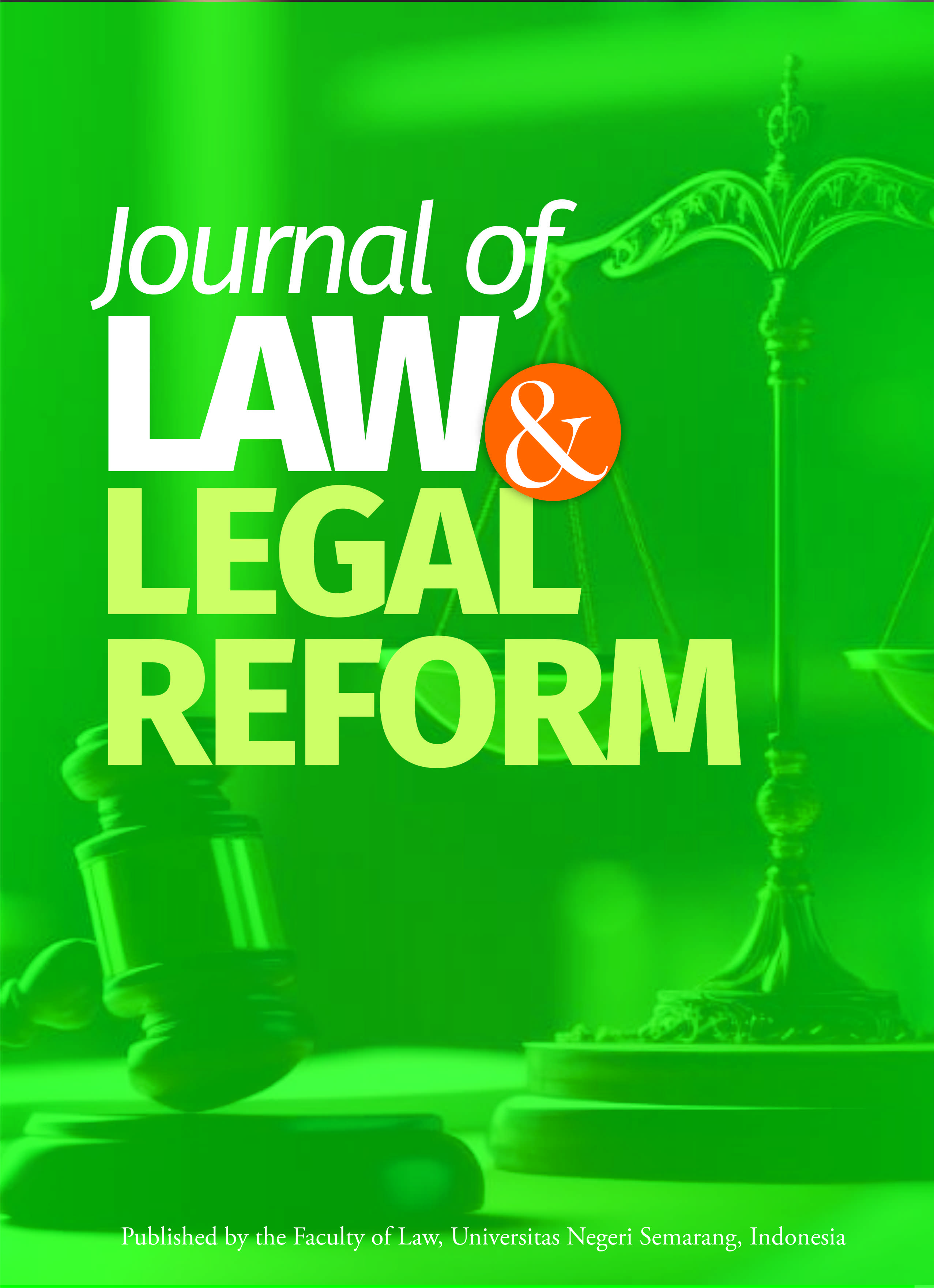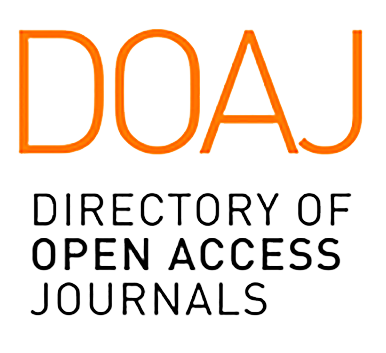Carbon Trading as a New Paradigm for Indonesia's Polluter Pays Principle
DOI:
https://doi.org/10.15294/jllr.vol5i1.2090Keywords:
GHG Emissions, Carbon Trading, Polluter Pays PrincipleAbstract
Climate change is driven by a combination of natural fluctuations and human activities, particularly the widespread use of fossil fuels (such as coal, oil, and natural gas) and alterations in land use practices such as logging, farming, and clearing land for agriculture. This global phenomenon encompasses various end-of-use activities, including agriculture, forestry, and consumerism. An inherent challenge in the global carbon dioxide (CO2) trading landscape lies in the competition between developed and developing countries, stemming from inconsistent CO2 prices. This competition manifests in three primary areas. Firstly, in the context of internationally transmitted mitigation outcomes, involving international trade aimed at surpassing Nationally Determined Contributions (NDC) targets. Secondly, it pertains to sustainable development mechanisms, specifically the use of carbon offsets derived from projects implemented by both public and private entities worldwide. The third aspect revolves around non-market approaches, encompassing emission reduction through mitigation and adaptation efforts, financial support, technology transfer, and capacity building, which may involve tools like carbon taxes and Carbon Border Adjustment Mechanism (CBAM). This research adopts a legal norm perspective, delving into methods that investigate, describe, synthesize, interpret, evaluate, and analyze positive approaches. The findings signify a paradigm shift aligning with the "polluter pays principle," recognizing that entities and individuals responsible for environmental pollution should bear the associated costs. In the quest for a new paradigm of sustainable development, a carbon market ecosystem assumes a pivotal role. This ecosystem contributes to enhancing sustainability by curbing greenhouse gas emissions and offering economic incentives to address climate change. It acts as a cornerstone in constructing a fresh paradigm for potential development.
References
Akib, Muhammad. "Aktualisasi Politik Hukum Lingkungan dalam Penyelenggaraan Otonomi Daerah." Thesis. (Bandar Lampung: Universitas Lampung, 2015).
Bhatia, Tajinder Pal Singh. “Economic Analyses of World’s Carbon Markets”. Thesis (Toronto: Faculty of Forestry and Centre for Environment University of Toronto, 2012).
Biedenkopf, Katja, Sarah Van Eynde, and Hayley Walker. "Policy infusion through capacity building and project interaction: greenhouse gas emissions trading in China." Global Environmental Politics 17, no. 3 (2017): 91-114.
Böhm, S., & Dabhi, S. Upsetting the Offset: The Political Economy of Carbon Markets. (London: MayFlyBooks, 2009).
Faradila, Novia, and Dewi Shafarhunny Aqilla. "Good Environmental Governance Mainstreaming in Preparation for the Implementation of Carbon Trading in Indonesia." The Indonesian Journal of International Clinical Legal Education 4, no. 4 (2022): 421-454.
Heggelund, Gørild M. "China’s climate and energy policy: at a turning point?." International Environmental Agreements: Politics, Law and Economics 21 (2021): 9-23.
Hongqiao, L. In-Depth Q&A: Will China’s Emissions Trading Scheme Help Tackle Climate Change?, 2021. Retrieved from https://www.carbonbrief.org/in-depth-qa-will-chinas-emissions-trading-schemehelp-tackle-climate-change
Hsiang, Solomon M., and Amir S. Jina. “The causal effect of environmental catastrophe on long-run economic growth: Evidence from 6,700 cyclones”. No. w20352. National Bureau of Economic Research, 2014.
Hübler, Michael, Sebastian Voigt, and Andreas Löschel. "Designing an emissions trading scheme for China—An up-to-date climate policy assessment." Energy policy 75 (2014): 57-72.
Humaira, Amanda. “Peran Indonesia Dalam Perdagangan Emisi Karbon (Carbon Trading) Dilihat Dari Perspektif Hukum Internasional”. Thesis. (Medan: Universitas Sumatera Utara, 2021).
Irawansyah, Irwansyah. Penelitian Hukum: Pilihan Metode dan Praktik Penulisan Artikel. (Yogyakarta: Mirra Buana Media, 2020).
Jones, Benjamin F., and Benjamin A. Olken. "The anatomy of start-stop growth." The Review of Economics and Statistics 90, no. 3 (2008): 582-587.
Li, Mengyu, Yuyan Weng, and Maosheng Duan. "Emissions, energy and economic impacts of linking China’s national ETS with the EU ETS." Applied energy 235 (2019): 1235-1244.
Louka, Elli. International Environmental Law, Fairness, Effectiveness, and World Order (New York: Cambridge University Press, 2006).
Mahardika, Ega Rijal, and Muhammad Azhary Bayu. "Legal Politics of Indonesian Environmental Management: Discourse Between Maintaining Environmental Sustainability and Economic Interests." Indonesian Journal of Environmental Law and Sustainable Development 1, no. 1 (2022): 1-28.
Mangku, Dewa Gede Sudika, and Ni Putu Rai Yuliartini. "Fulfillment of Labor Rights for Persons with Disabilities in Indonesia." International Journal of Criminology and Sociology 10, no. 1 (2021): 272-280.
Nasution, Bahder Johan. Metode Penelitian Hukum. (Bandung: Mandar Maju, 2008).
Novitasari, Zeni, Bagus Sigit Sunarko, and Honest Dody Molasy. "Peningkatan Emisi Karbon Pasca Penerapan Program Carbon Trade di India." Electronical Journal of Social and Political Sciences (E-SOSPOL) 8, no. 3 (2021): 120-128.
Paul, A. Carbon Credit and Carbon Trading in India: Overview. (Calcutta: Research Scholar, Department of Commerce University of Calcutta, 2010).
Pielke Jr, Roger. “How to Understand the New IPCC Report: Part 2, Extreme Events,” 2021, https://rogerpielkejr.substack.com/p/how-to-understand-the-new-ipcc-report-1e3
Purwendah, Elly Kristiani. "Penerapan Regime Tanggung Jawab dan Kompensasi Ganti Rugi Pencemaran Minyak oleh Kapal Tanker di Indonesia." Jurnal Komunikasi Hukum (JKH) 2, no. 2 (2016): 127-146.
Republic of Indonesia. President Regulations Number 98 of 2021 concerning Implementation of Carbon Economic Value for Achievement of Determined Contribution Targets Nationally and Controlling Greenhouse Gas Emissions in National Developments.
Sari, Sinta Wahyu Purnama, and Widya Krulinasari. "Carbon Trading According to International Law and Its Implementation in Indonesia." Fiat Justisia: Jurnal Ilmu Hukum 9, no. 2 (2015): 151-155.
Sarmilah, Milah, Lina Mustafidah, and Hellen George. "Civil Liability for Mining Companies for Environmental Pollution Based on Indonesian Laws." Indonesian Journal of Environmental Law and Sustainable Development 1, no. 2 (2022): 165-188.
Timperley, J. “Q&A: How will China’s new carbon trading scheme work?” Carbon Brief, 2018. Retrieved from https://www.carbonbrief.org/qa‐how‐will‐chinas‐ new‐carbon‐trading‐scheme‐work
UNFCC. United Nations Framework Convention on Climate Change, “A Glimpse into Climate Change,” unfccc.int, 2018, http://unfccc.int/files/meetings/cop_13/press/application/pdf/sekilas_untuk_cepat_iklim.pdf.
Wijayanto, Adi, Hatta Acarya Wiraraja, and Siti Aminah Idris. "Forest Fire and Environmental Damage: The Indonesian Legal Policy and Law Enforcement." Unnes Law Journal 8, no. 1 (2022): 105-132.
World Bank. Exploring East Asian cooperation on carbon markets, 2016. Retrieved from https://www.worldbank.org/en/news/feature/2016/06/16/exploring‐east‐asian‐ cooperation‐on‐carbon‐markets
Yudhana, Fachrizal Woma, and Maria Madalina. "Formulasi kebijakan penerapan pajak karbon di Indonesia." Souvereignty 1, no. 1 (2022): 68-78.
Downloads
Published
Article ID
2090Issue
Section
License

This work is licensed under a Creative Commons Attribution-NonCommercial-ShareAlike 4.0 International License.
All writings published in this journal are personal views of the authors and do not represent the views of this journal and the author's affiliated institutions. Author(s) retain copyrights under a Creative Commons Attribution-NonCommercial-ShareAlike 4.0 International (CC BY-NC-SA 4.0).









